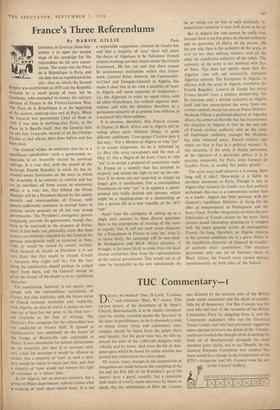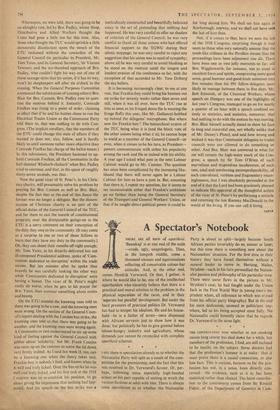TUC Commentary -I
DELETE, we beseech Thee, 0 Lord, "Cannon, L.," and substitute "Blair, W." Amen.' This curious prayer, if the incumbent of St. Peter's Church, Bournemouth, is to be wholly consistent (and the worthy reverend quotes the Spectator in his letter to parishioners, so he is obviously a man in whose breast virtue and consistency com- mingle), should be heard from the pulpit there next Sunday. For the good vicar has, he tells us, prayed for each of the 1,000-odd delegates indi- vidually and by name. And since the list of dele- gates upon which he based his noble mission was printed this substitution has taken place.
Of course, many changes in the composition of delegations are made between the compiling of the list and the first fall of the President's gavel (he doesn't have a gavel, actually, but a miserable little tinkle of a bell), made necessary by illness or death. But the substitution of Blair for Cannon was dictated by the sickness only of the British trade union movement and the death of another little bit of democracy. For Bro. Cannon was the man who fell foul of the remnants of the British Communist Party by resigning from it, and the Communist racketeers who run the Electrical Trades Union, and who had previously rigged the union election to ensure the defeat of Mr. Cannon, could not stomach the thought of his breathing the fresh air of Bournemouth alongside the more obedient party hacks, not to say Haxells. So the General Purposes Committee was notified that there would be a change in the composition of the ETU's delegation, and Mr. Cannon took his seat in the Visitors' Gallery.
Whereupon, we were told, there was going to be an almighty row, led by Bro. Padley, whose Shop, Distributive and Allied Workers thought the Corns had gone a little too far this time. Alas, those who thought the TUC would sprinkle a little democratic disinfectant upon the stench of the ETU reckoned without the cowardice of the General Council (in particular its President, Mr. Torn Yates, and its General Secretary, Sir Vincent Tewson), and the ten-thumbed approach of Bro. Padley, who couldn't fight his way out of one of those sausage-skins that his union, if it has its way, won't let shopkeepers sell after six o'clock in the evening. When the General Purposes Committee announced the substitution of (among others) Bro. Blair for Bro. Cannon, Bro. Padley rose to ques- tion the motives behind it. Instantly, Comrade Foulkes was rising to a point of order, claiming in effect that if he and his butties chose to run the Electrical Trades Union as the Communist Party told them to, that was nothing to do with Con- gress. (The implicit corollary, that the members of the ETU could change this state of affairs if they wanted to does not, alas, follow, and is hardly likely to until someone rather more objective than Comrade Foulkes has charge of the ballot-boxes.) In this submission, the President hastened to up- hold Comrade Foulkes, all the Communists in the hall shouted 'Rhubarb-rhubarb' when Bro. Padley tried to continue, and that, in the space of roughly thirty-seven seconds, was that.
Now the good vicar of St. Peter's, in his Chris- tian charity, will presumably solve his problem by praying for Bro. Cannon as well as Bro. Blair, despite the fact that at the end of this fiasco the former was no longer a delegate. But the dissem- ination of Christian charity is no part of the official duties of the General Council of the TUC, and for them to cast the mantle of constitutional propriety over the disreputable goings-on in the ETU is a sorry comment on their conception of the duty they owe to the community. (It may come as a surprise to one or two of those fellows to learn that they have any duty to the community.) Oh, they can shoot their mouths off right enough; Mr. Tom Yates, in his drearily-delivered but not ill-composed Presidential address, spoke of 'Com- munists dedicated to disruption' within the trade unions. But ten minutes after he spoke thus bravely he was carefully looking the other way while 'Communists dedicated to disruption' were having a beano. The vicar of St. Peter's might easily do worse, when he gets to his prayer for Bro. Yates, than murmur something about motes and beams.
On the ETU scandal the knowing ones told us there was going to be a row, and the knowing ones were wrong. On the section of the General Coun- cil's report dealing with the London bus strike, the knowing ones told us that there was going to be another, and the knowing ones were wrong again.
A Communist or two endeavoured to stir up some kind of feeling against the General Council with jabber about 'solidarity,' but Mr. Frank Cousins was soon up on the rostrum to screw the lid down very firmly indeed. As I said last week (I, too, can be a knowing one when the fancy takes me),
Frankie-boy is nobody's fool, and knows when he is well and truly licked. Over the bus strike he was well and truly licked, and his first task at the 1958 Congress was to re-establish his position, to go about giving the impression that nothing had hap- pened. And his speech on the bus strike was a meticulously constructed and beautifully balanced essay in the art of pretending that nothing had happened. He was very careful to offer no shadow of criticism of the General Council; he was very careful to thank all those unions who had offered financial support to the TGWU during their idiotic stoppage; he was very careful to reject any suggestion that his union was in need of sympathy; above all he was very careful to avoid blushing as he stood on the rostrum amid the longest and loudest ovation of the conference so far, with the exception of that accorded to Mr. Tom Dribere the day before.
It is becoming increasingly clear, to me at any rate, that Frankie-boy could bring his busmen out on strike for seventy weeks rather than seven and still, when it was all over, have the TUC rise at him as soon as his fringed dome (he is wearing the fringe fluffy this year, like Mr. Gollancz) bobbed up behind the delegates' microphone. But where now for Frankie-boy? The hierarchical system of the TUC being what it is (and the block vote of the other unions being what it is), he cannot hope to wield as a member of the General Council—or
• even, when it comes to be his turn, as President— powers commensurate with either his popularity among the rank and file or indeed with his ability. A year ago I asked what post in the next Labour Cabinet would go to Mr. Cousins. The question has since been complicated by the increasing like- lihood that there will never again be a Labour Cabinet for him to have a post in. But, assuming that there is, I repeat my question, for it seems to me inconceivable either that Frankie's ambitions go no farther than being the General Secretary of the Transport and General Workers' Union, or that if he sought direct political power it could be for long denied him. We shall see him again at Scarborough, anyway, and we shall not have seen the last of him then.
Nor, if it comes to that, have we seen the last of the 1958 Congress, surprising though it may seem to those who very naturally assume that the tomb-like stillness in the Pavilion means that the proceedings have been adjourned sine die. There have been one or two jolly moments so far; old Bro. Wigglesworth, for instance, was as usual in excellent form and spirits, compressing more good sense, good humour and good trade unionism into five minutes than his 991 fellow-delegates seem likely to manage between them in five days. Mr. Bob Edwards, of the Chemical Workers, whose speech on Hungary was one of the highlights of last year's Congress, managed to go on for nearly a quarter of an hour with a speech confined en- tirely to statistics, and statistics, moreover, that had nothing to do with the motion he was moving. Bro. Blair himself actually dared to show his face (a long and mournful one, not wholly unlike that of Mr. Disney's Pluto), and said how wrong and wicked it was that Communist delegates to trades councils were not allowed to do something or other. And Bro. Blair was answered in what for me will remain the high-water mark of the Con- gress; a speech by Sir Tom O'Brien of such marvellous and stupendous incoherence, of such vast, total and unrelenting incomprehensibility, of such convoluted, verbless and fragmentary mean- inglessness, that I was absolutely persuaded at the end of it that the Lord had been graciously pleased to indicate His approval of the thoughtful action of the vicar of St. Peter's by performing a miracle and returning the late Ramsay MacDonald to the world of the living. If you can call it living.
TAPIR



































 Previous page
Previous page